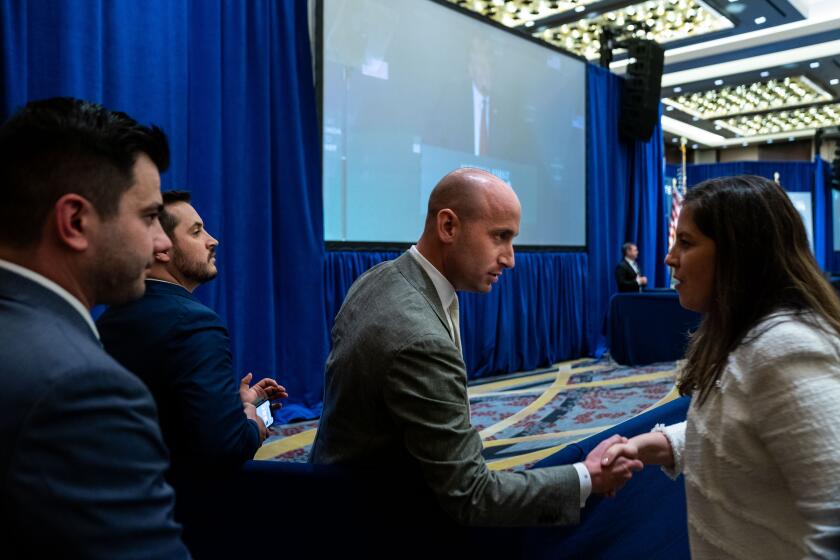Iowa repeals gender parity rule for governing bodies as diversity policies garner growing opposition

- Share via
DES MOINES — An explicit requirement that Iowa’s state, county and local decision-making bodies be balanced by gender was repealed Wednesday, a move that Gov. Kim Reynolds said was common sense but which critics warn may lead to fewer opportunities for women.
Before signing the repeal bill into law, Reynolds said the focus for boards and commissions “should always be on appointing the most qualified people.”
The repeal reflects a growing trend across the U.S. as conservative lawmakers target many efforts to promote diversity as well as protections for historically marginalized groups as fundamentally discriminatory, emphasizing merit instead.
Advocates for Iowa’s gender balance requirement, including Democrats in the Legislature, criticized the assumption that progress in representation means discrimination doesn’t exist.
Companies are changing their diversity programs under attack from conservative activists, including a group founded by Trump advisor Stephen Miller.
Compared with a decade ago, there are more gender-balanced bodies in Iowa, meaning women are better distributed across them, according to the Carrie Chapman Catt Center for Women and Politics at Iowa State University.
Still, those opposed to the repeal emphasized that boards and commissions have yet to reach parity even with the mandate and warned that disparities can worsen.
Iowa was the first state to initiate the requirement for statewide boards and commissions when the law passed over three decades ago; then, the Legislature extended the requirement to all levels of government, to go into effect in 2012. It required a three-month waiting period before applicants of any gender could be considered.
The repeal means officials do not have to first try to find a qualified applicant that would bring gender parity to bodies like the human rights commission or the licensing board for doctors.
2023 Diversity, Equity, Inclusion and Accessibility (DEIA) Visionaries
How Flexible Working Policies Impact Diversity & Inclusion
In today’s dynamic work landscape, where being offered some kind of flexible working option is now the norm, many companies continue to grapple with the best way to implement flexible working to effectively balance their business goals with employee expectations.
More than a dozen states have laws encouraging authorities to appoint members of statewide boards and commissions that reflect the population they serve by gender. Many of those statutes are being targeted in the courts.
Some Iowa lawmakers supporting the repeal cited one of those cases, which alleged the state’s gender balance mandate for the commission recommending judicial nominees to the governor was unconstitutional. A federal judge agreed, ruling earlier this year that there’s not sufficient evidence the law is compensating for discrimination now like it was when it was first introduced in 1987.
Reynolds was joined Wednesday by the plaintiff in that case — Chuck Hurley, who is vice president and chief counsel at a conservative Christian organization, Family Leader — and the attorneys who represented him. They included attorneys with the Pacific Legal Foundation, a national firm that focuses on what it considers to be government overreach and has brought similar cases in Arkansas, Tennessee, Alabama and Louisiana.
“We appreciate all of your work in helping us get this across the finish line,” Reynolds said.
Fingerhut writes for the Associated Press.
More to Read
Sign up for Essential California
The most important California stories and recommendations in your inbox every morning.
You may occasionally receive promotional content from the Los Angeles Times.












